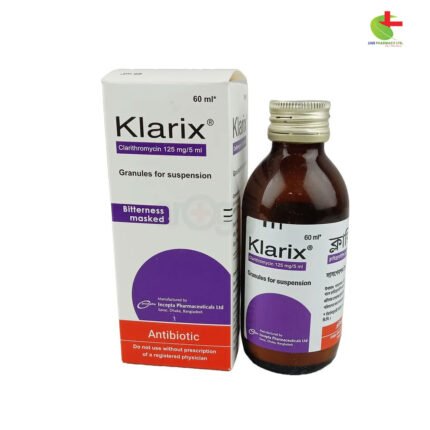Beuflox Suspension
100.00৳ Bottle (60 ml)
- Beuflox is an antibacterial agent indicated for treating various infections caused by susceptible organisms, including severe systemic, respiratory, urinary, and skin infections.
- Its broad-spectrum activity covers gram-negative and some gram-positive bacteria, making it effective against resistant strains.
- Dosage varies based on infection severity, with options for oral and IV administration.
- Common side effects may include gastrointestinal disturbances and CNS effects; caution is advised in patients with a history of hypersensitivity.
- Storage conditions require protection from light and moisture, keeping it below 30°C.
Indications
Beuflox is prescribed for the treatment of single or multiple infections caused by susceptible organisms, including those resistant to other antibiotics such as Aminoglycosides, Penicillins, and Cephalosporins.
Due to its ability to reach effective antibacterial concentrations in the serum, body tissues, and urine after oral administration, Beuflox is recommended for a variety of infections. These include urinary, respiratory, gastrointestinal infections, gonorrhea, and septicemia. The strong tissue penetration and broad-spectrum antibacterial activity (including antipseudomonal) make Beuflox an excellent choice, either alone (pending sensitivity results) or in combination with Aminoglycosides, beta-lactam antibiotics (for neutropenic conditions), or antibiotics effective against anaerobes (for suspected Bacteroides fragilis infections).
Beuflox is indicated for treating the following infections caused by susceptible bacteria:
- Severe systemic infections: Septicemia, bacteremia, peritonitis, infections in immunocompromised patients with hematological or solid tumors, or those in intensive care with conditions like infected burns.
- Respiratory tract infections: Lobar pneumonia, bronchopneumonia, acute/chronic bronchitis, cystic fibrosis exacerbation, bronchiectasis, empyema.
- Urinary tract infections: Uncomplicated or complicated urethritis, cystitis, pyelonephritis, prostatitis, epididymitis.
- Skin and soft tissue infections: Infected ulcers, wound infections, abscesses, cellulitis, otitis externa, erysipelas, and infected burns.
- Gastrointestinal infections: Enteric fever, infectious diarrhea.
- Biliary tract infections: Cholangitis, cholecystitis, empyema of the gallbladder.
- Intra-abdominal infections: Peritonitis, intra-abdominal abscesses.
- Bone and joint infections: Osteomyelitis, septic arthritis.
- Pelvic infections: Salpingitis, endometritis, pelvic inflammatory disease.
- ENT infections: Otitis media, sinusitis, mastoiditis, tonsillitis.
- Gonorrhea: Urethral, rectal, and pharyngeal gonorrhea caused by beta-lactamase-producing organisms or those moderately sensitive to penicillin.
Always follow the dosage and treatment plan prescribed by your healthcare provider.
Pharmacology
Ciprofloxacin, the active ingredient in Beuflox, is a synthetic quinolone antibiotic with a broad spectrum of activity. It effectively combats gram-negative aerobic bacteria like Enterobacteriaceae and Pseudomonas aeruginosa, and also shows activity against gram-positive aerobic bacteria, including methicillin-resistant staphylococci. Ciprofloxacin’s bactericidal effect results from disrupting the bacterial DNA gyrase enzyme, crucial for DNA synthesis.
After oral administration, Ciprofloxacin is rapidly absorbed from the gastrointestinal tract and widely distributed throughout body tissues and fluids. The drug has a half-life of around 3.5 hours, with 30-50% excreted unchanged in the urine within 24 hours.
Dosage
Adults: Typically, doses range from 100-750 mg twice daily, depending on the infection’s severity and the patient’s condition.
- Urinary tract infections: 250-500 mg twice daily.
- Respiratory tract infections: 250-500 mg twice daily, with 750 mg twice daily recommended for Streptococcus pneumoniae infections.
- Gonorrhea: Single dose of 250-500 mg.
- Other infections: 500-750 mg twice daily.
Cystic fibrosis patients with pseudomonal infections usually require 750 mg twice daily, though dosage adjustments may be considered based on body weight.
Renal impairment: In cases of severe renal impairment (serum creatinine >265 micromol/L or creatinine clearance <20 ml/min), dosage may be halved.
Elderly: No dosage adjustment required despite higher serum levels in this population.
Children: Ciprofloxacin should be avoided in growing children unless the benefits outweigh the risks, with a dose of 7.5-15 mg/kg/day in divided doses for severe infections.
Duration of Treatment
Treatment duration depends on infection severity, clinical response, and bacterial eradication. For acute infections, the usual treatment lasts 5-10 days, continuing for three days after symptoms resolve.
Extended-release tablets:
- Acute cystitis: 1000 mg once daily for three days.
Intravenous infusion:
- Urinary tract infection: 200 mg every 12 hours for 7-14 days (mild to moderate); 400 mg every 12 hours for severe cases.
- Respiratory tract infections: 400 mg every 12 or 8 hours for 7-14 days, depending on severity.
- Nosocomial pneumonia: 400 mg every 8 hours for 10-14 days.
Precautions & Warnings
Beuflox should be used cautiously in patients with known or suspected CNS disorders like arteriosclerosis or epilepsy, as it may provoke seizures.
Ensure adequate fluid intake while on Beuflox. Avoid concurrent use of antacids or products containing magnesium, aluminum, calcium, iron, or zinc, as these can reduce Beuflox absorption. If necessary, take these supplements two hours after or six hours before Beuflox.
Avoid consuming Beuflox with milk or dairy products alone, as absorption may be hindered.
Side Effects
Common side effects include gastrointestinal disturbances (nausea, diarrhea, vomiting), CNS effects (headache, dizziness, confusion), hypersensitivity reactions (rash, itching), and joint pain. Rare but serious side effects like Stevens-Johnson syndrome, toxic epidermal necrolysis, and liver enzyme elevation have also been reported.
Pregnancy & Lactation
Though animal studies have shown no evidence of teratogenicity, Ciprofloxacin may cause joint issues in young animals. Therefore, its use during pregnancy and lactation is not recommended.
Storage Instructions
Store Beuflox below 30°C, away from light and moisture, and out of the reach of children.












Reviews
There are no reviews yet.